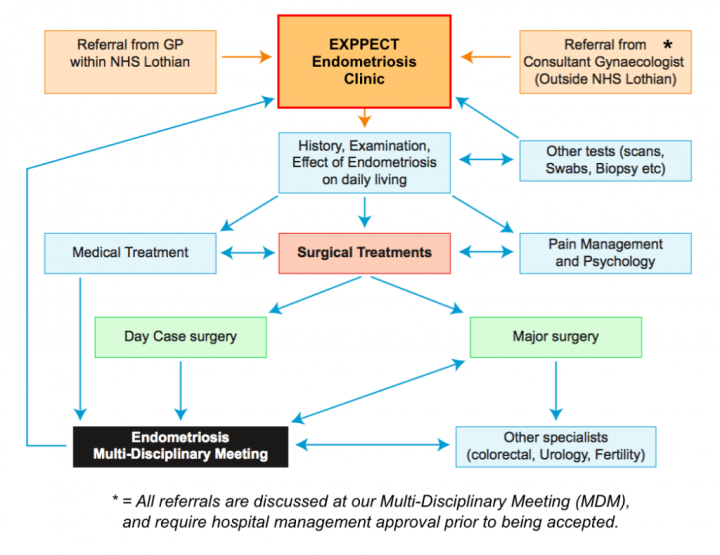What happens at our clinic?
Who runs the clinic, what is involved in clinic appointments and how to prepare, and next steps after clinic are summarised here.
Who runs the EXPPECT Endometriosis Clinic?
The EXPPECT Endometriosis Clinic currently takes place in the Gynaecology Outpatient Department in the Simpson Centre for Reproductive Health at the Royal Infirmary of Edinburgh. Please check your clinic appointment letter carefully as some of our appointments are now carried out via video-conferencing or telephone, and there are occasionally extra clinics taking place at St John’s Hospital in Livingston.
The EXPPECT Endometriosis Team consists of five Gynaecology consultants who have experience and expertise in endometriosis treatment, supported by our Endometriosis Nurse Specialist.
When endometriosis is suspected to affect the bowel or bladder, our colleagues in Colorectal and Urological surgery will provide us with support.
What will happen to me at my appointment?
A member of the EXPPECT Endometriosis Team will see you and review your symptoms of endometriosis. This will cover previous investigations and treatments for endometriosis, and importantly the effect of your symptoms on your day-to-day life.
An examination is usually helpful in assessing this fully. The abdomen (tummy) and pelvis (vagina) are examined with your permission, and the support of a nurse chaperone. There is always privacy to undress and dress.
The effect of endometriosis can vary hugely between women. The recommendations suggested will be individualised. Below are examples of possible plans for care, of which one or more may take place in sequence or in parallel.
Investigations
Further investigations may be arranged to detect evidence of endometriosis or alternative causes for symptoms experienced. These may include blood tests, vaginal swabs to check for infections, ultrasound or MRI (Magnetic Resonance Imaging) scans, or biopsies (small samples) from the womb lining or from the cervix (neck of the womb). More specialist tests involving the bladder (e.g. cystoscopy) and bowel (e.g. sigmoidoscopy) may be required, meaning additional appointments have to be arranged.
Medical Treatments
Medical treatments for endometriosis may be started. These fall into three broad categories.
- Treatments that involve taking extra hormones
- Treatments that result in lower hormone levels
- Treatments that alter nerve pathways which transmit pain
Surgical Treatments
Surgical treatment and investigation for endometriosis may be arranged. Laparoscopy (keyhole camera) is usually arranged in the Day Surgery Unit at the Royal Infirmary or St John’s Hospital where most women will be able to be discharged the same day.
Mild to moderate endometriosis can be treated if discovered at the time of surgery.
Moderate and severe endometriosis may be treated by keyhole or traditional open surgery but may require a longer operation, in which case the endometriosis is often treated at a second procedure. This will usually involve an overnight stay in the gynaecology ward.
Multi-Disciplinary Meeting (MDM)
When other factors make endometriosis surgery very complex or high risk, we discuss cases at our Endometriosis MDM. This is a full review of your history, examination findings and the results of any investigations (or previous surgery) with the EXPPECT Endometriosis Team, radiologist colleagues and other colleagues as required.
We use this to plan your medical management and/or the type of surgery proposed (and the safest place for it to take place, and if direct involvement of our colleagues in the Western General Hospital is required). This means that some women will be offered a date for surgery at the Western General Hospital.
The MDM is also used to review and guide improvements in our service.
How can I prepare for my appointment?
Most women will be referred by their GP in Lothian. Referrals from outside NHS Lothian will be made by a Gynaecology Consultant in the woman’s Health Board.
It can be helpful to bring a family member or friend for support and any questions you have to the Clinic.
We have an active Endometriosis and Pelvic Pain research programme. Should you be suitable for one of our studies, a researcher or one of our clinical research nurses may approach you for the optional opportunity to discuss any research in more detail.

What will happen after my appointment?
This will depend very much on your unique set of symptoms and the results of your investigations, which will guide your treatment.
An idea of the steps involved are shown in the flowchart.
What happens at dietetic clinic?
Dietitians can provide evidence-based information on diet as well as personalised nutritional advice for gastrointestinal symptoms or onward referral to other dietetic specialities as required.
Whilst diet cannot cure pelvic pain or endometriosis seeing a dietitian may help improve your quality of life, relationship with food and/or may improve symptoms.
When you see a dietitian at clinic, you will be asked about your nutritional concerns and health goals. The dietitian will then complete a nutritional assessment which includes asking questions about your weight and weight history, checking your blood results, gathering information about your clinical condition, asking about your diet and dietary habits and environmental factors which may affect your diet.
At the start of your appointment your weight will be taken, if you feel uncomfortable being weighed or do not wish to know your weight, please make this known to the dietitian.
A new appointment takes 45 minutes, and a review appointment is 30 minutes.
Referrals to the EXPPECT Dietitian usually come from a member of the EXPPECT Team.


